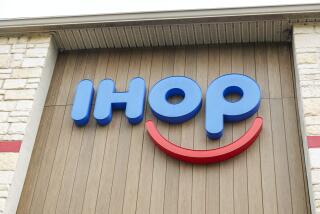On Campus Fast-Food Restaurants May Cook Up Cash for 2 Schools
- Share via
Gary Naiman figures if you want to raise money fast, sell fast food.
The idea worked when Naiman raised funds for a charity last year, so when the Grossmont Educational Foundation was looking for ways to raise money to revive some sports programs in the high school district, Naiman suggested building a couple of Jack in the Boxes. On school grounds.
Under the plan--possibly the first of its kind in the nation--Jack in the Box restaurants would be built on the campuses of Chaparral High School in El Cajon and Santana High School in Santee. About $100,000 a year from the profits of the fast-food restaurants would go to the Grossmont Educational Foundation.
“I’ve done this before. I set up a group of private investors, then we buy some Jack in the Boxes and give the money to charity,” said Naiman, who is on the Grossmont Educational Foundation board.
Naiman and other investors bought eight Jack in the Box restaurants in San Diego and have raised about $50,000 to aid the Israeli city of Kiryat Malachi, which the United Jewish Appeal has paired with San Diego for fund raising, Naiman said.
Kenneth Overstreet, president of the Grossmont foundation, said the restaurants would also be used to supplement the high schools’ vocational training programs. Students would get credit for being trained in “all phases of fast food, from cooking to serving to restaurant management.”
Freshman Sports
Funds raised by the restaurants would help pay for freshman sports programs and other extracurricular activities that were eliminated in the wake of Proposition 13.
Studies have shown that vocational training and strong extracurricular programs help reduce the dropout rate, Overstreet said. He hopes the Jack in the Box program will help cut the district-wide dropout rate of 32%.
Naiman said he hopes the program will “maybe keep (students) off the streets.” He also thinks students will get jobs at other fast-food restaurants as the result of their training on campus. It has not been decided whether students will be paid during training, Naiman said. Starting pay at the restaurants would be the minimum wage of $3.35 an hour.
Naiman and Overstreet had hoped to have the restaurants open for business by the fall, but they must first obtain zoning approval from the El Cajon and Santee city councils. That means that construction would not begin until at least August in Santee and November in El Cajon, Overstreet said.
El Cajon Planning Director Ray Henson said he anticipates opposition to the idea. Like their off-campus counterparts, the Jack in the Boxes would be open late at night. Henson pointed out a Jack in the Box would be going up next to the “finest residential development in the city. When you introduce a radical change like that, there’s always opposition. Even a well-done Jack in the Box, to me, is going to look funny there,” Henson said.
‘Ready to Go’
Naiman said he doesn’t think there will be significant opposition to the project. “It’s going to be pretty tough for a community to say no, because the money’s going to charity,” he said. “As soon as the zoning is approved, we’re ready to go. The money’s all set.”
Building fast-food franchises on government property is not unprecedented--at Camp Pendleton, for instance, there are three Burger Kings and a McDonald’s--but this would apparently be the first time that a franchise was built on high school campuses to raise money for the schools.
Overstreet said he is aware of one other high school district in California which is putting its land to commercial use, but he has not heard of any schools putting up fast-food franchises on their land.
Naiman said his group bought the first of their eight Jack in the Boxes last June. The eighth just opened on Thursday. “(They) just took off like gang busters,” he said.
Investors get a modest return on their investment, Naiman said, but most of the profits go to charity.
More to Read
Sign up for Essential California
The most important California stories and recommendations in your inbox every morning.
You may occasionally receive promotional content from the Los Angeles Times.













